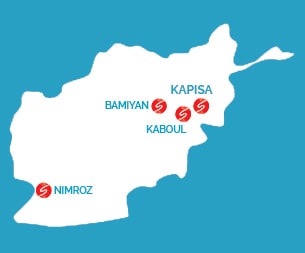Malala, 40 and the mother of six, and the residents of Astakalan village, in Kunduz province, are suffering from the battle of hegemony between the Afghan government and the Taliban opposition group. She crossed the entire country with her daughters.
“We used to live in Kunduz, where my husband was murdered. My 16 year-old son started working in the village to earn money for the family. We were eating barely enough food but were happy,” said Malala as she remembered her life before she was displaced.
“The inception of fighting in Kunduz changed our life. The deteriorating security situation forced my brother and his family to leave Kunduz. As a woman, I was unable to decide my own destiny.”
After a short moment of silence, her eyes filled up with tears as she started talking about her older son: “It was around 2pm when my son went out of home, just as the fighting broke out. There was firing from both the sides, bombing, and many people died. I went out to find my son, but I could not find him among the corpses.”
The ordeal of displacement
After three unsuccessful months trying to find her son, Malala decided to move to Khost to meet her brother there, to find protection and safety for her daughters. She still does not know what happened to her son.
To survive after her displacement, Malala started a handicraft business with a grant from SOLIDARITÉS INTERNATIONAL, with support from the European Union: “I received 18,000 Afghanis [200 euros], four bags of flour and a bottle of cooking oil.” Malala spent 8,000 Afghanis to buy a sewing machine: “My two older daughters now use the machine to sew clothes for the people, they make handicrafts and earn 200 Afghanis per piece of clothing they sew!” Malala herself visits homes searching for customers.
Unsafe at night
My daughters want to work at night too, but they cannot in the dark. Sometimes I hear rumors that wicked boys roam the area, I am afraid they will harm us, which gives me anxiety. We have no electricity and cannot afford a solar system. That would really help us reduce our financial dependency.
Malala is worried about her future, but meets the support of the communities she lives with: “While visiting homes, some women who have been through similar hardship tell me to be patient. Such situations are not permanent; your life will also change. The time will come when you will be self-sufficient financially and your daughters will also live a prosperous life. I feel better when I meet such sympathetic people.”
Support Malala and other displaced Afghans
DONATE
Photos © Sandra Calligaro for SOLIDARITÉS INTERNATIONAL
Afghanistan
Context and action- 43 inhabitants
- 180th out of 191 countries on the Human Development Index
- 146.500 people helped

